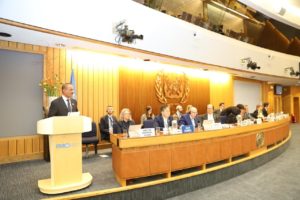
UAE discusses four key challenges facing global maritime sector during IMO’s 31st General Assembly Meeting in London
- Federal Transport Authority – Land & Maritime proposes ways to address major issues
- E. Al Nuaimi: UAE has helped develop new standards to prevent fraudulent ship registrations
H.E. Dr. Abdullah Belhaif Al Nuaimi, the UAE Minister of Infrastructure Development and Chairman of FTA – Land and Maritime, recently underscored the four key areas in the maritime sector that are expected to bring new challenges to the global maritime community. Speaking on the sidelines of the 31st General Assembly of the International Maritime Organization (IMO) in London, H.E. Al Nuaimi cited cybersecurity, port development and modernization, the seafaring profession, and collective maritime capacity building as the fundamentals that will help shape the future of the industry. As such, he said joint programs and collective actions among international players and stakeholders are needed to address and anticipate challenges that may arise in these areas.
On cybersecurity, H.E. Al Nuaimi pointed out that building a safe and secure digital infrastructure is crucial to the future of the Maritime Autonomous Surface Ships (MASS), which rely heavily on the integrity of information and communications technology (ICT) systems and data confidentiality. According to him, a strategic plan by IMO will help identify the needed improvements and steps to reduce cybersecurity risks and, consequently, avoid a global disruption to the global supply chain and international trade.
As for port management, he said that the global maritime community should work together to modernize ports and ensure that they are capable of meeting the future demands of the shipping industry and the growing maritime trade. The future smart ships will demand smart ports as connected technologies continue to move the maritime sector into the digital age, he added. Enhanced collaboration between port stakeholders will help optimize operations, promote efficiency, reduce logistics costs, and support a green and sustainable maritime environment.
The third key area, the seafaring profession, is facing two current and future challenges. H.E. pointed out the shortage of skilled seafarers worldwide and the critical skills upgrade in line with the rising digitalization in the maritime industry, which accounts for 90 per cent of the total world trade.
On the fourth area, he said that the international maritime community should collaborate to promote the sector’s global competitiveness, build a sustainable maritime shipping segment, and optimize the use of energy resources, while ensuring environmental sustainability.
To meet future challenges, the UAE has already aligned its National Maritime Strategy with the IMO Strategic Plan 2018-2023. In addition, the UAE has adhered to the IMO’s directive in relation to the reduction of greenhouse gas (GHG) emission of ships. The country has also expressed its continued support for the development of a follow-up action plan and the fourth IMO’s GHG study. Further, it has developed the 2017-2050 National Plan for Climate Change, which aims to address climate change challenges and support the United Nations’ Sustainable Development Goals.
He said: “The UAE is working closely with IMO’s member states to help prepare a proposal dealing with MASS regulations under the supervision of the Maritime Safety Committee and Legal Committee. We also contributed to the making of new measures designed to prevent unlawful and fraudulent registration practices in the shipping industry.”
H.E. Al Nuaimi added: “The UAE has made valuable contributions to many of IMO’s initiatives, including implementation of reforms, improvement of the application process for the consultative status of non-government organizations (NGOs), and introduction of e-voting.”
The FTA has reviewed the UAE’s maritime accomplishments, from the establishment of the National Trade and Transport Facilitation Committee (NTTFC) to maritime education and training. The NTTFC was established to bring together the maritime, air, land, and rail transport sectors under a unified national framework and a single window platform. On training, a Memorandum of Understanding was signed between the Government of Sharjah and the Arab Academy for Science, Technology, and Maritime Transport in this regard. In addition, the Abu Dhabi Maritime Academy was established to provide a world-class maritime education.






